-
 The 15 Biggest Risks Of Artificial Intelligence
The 15 Biggest Risks Of Artificial Intelligence As the world witnesses unprecedented growth in artificial intelligence (AI) technologies, it's essential to consider the potential risks and challenges associated with their widespread adoption. AI does present some significant dangers — from job displacement to security and privacy concerns — and encouraging awareness of issues helps us engage in conversations about AI's legal, ethical, and societal implications.
-
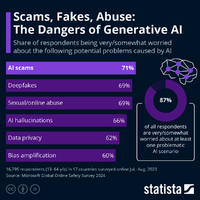 What Are the Biggest Perceived Dangers of AI?
What Are the Biggest Perceived Dangers of AI? 16,795 respondents (13-64 y/o) in 17 countries surveyed online Jul.-Aug. 2023
-
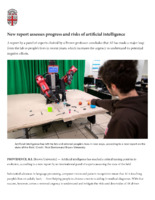 New report assesses progress and risks of artificial intelligence
New report assesses progress and risks of artificial intelligence A report by a panel of experts chaired by a Brown professor concludes that AI has made a major leap from the lab to people’s lives in recent years, which increases the urgency to understand its potential negative effects.
-
 The Impact of Artificial Intelligence on Education
The Impact of Artificial Intelligence on Education A blog post from a contributor with Forbes.
-
 AI Technology is Disrupting the Traditional Classroom. Here’s a Progress Report.
AI Technology is Disrupting the Traditional Classroom. Here’s a Progress Report. A news posts from PBS focusing on how artificial intelligence has the potential to personalize learning at scale. The challenge: making sure it benefits everyone.
-
 How ChatGPT and similar AI will disrupt education
How ChatGPT and similar AI will disrupt education A news post on how teachers are concerned about cheating and inaccurate information.
-
 Is AI exacerbating disparities in education?
Is AI exacerbating disparities in education? Stanford students’ contribution to a U.N. report on global education emphasized the importance of including community stakeholders when deploying new technologies, to avoid “perpetuating past mistakes and encoding them into the future.”
-
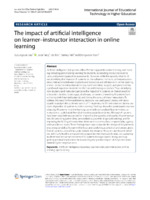 The impact of artificial intelligence on learner–instructor interaction in online learning
The impact of artificial intelligence on learner–instructor interaction in online learning
-
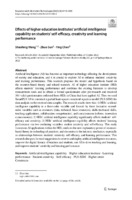 Effects of higher education institutes’ artificial intelligence
capability on students’ self‑efficacy, creativity and learning
performance
Effects of higher education institutes’ artificial intelligence
capability on students’ self‑efficacy, creativity and learning
performance
-
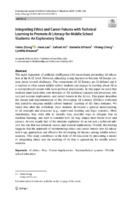 Integrating Ethics and Career Futures with Technical Learning to Promote AI Literacy for Middle School Students: An Exploratory Study
Integrating Ethics and Career Futures with Technical Learning to Promote AI Literacy for Middle School Students: An Exploratory Study
-
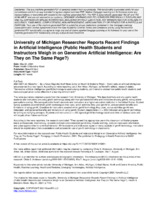 University of Michigan Researcher Reports Recent Findings in Artificial Intelligence (Public Health Students and Instructors Weigh in on Generative Artificial Intelligence: Are They on The Same Page?)
University of Michigan Researcher Reports Recent Findings in Artificial Intelligence (Public Health Students and Instructors Weigh in on Generative Artificial Intelligence: Are They on The Same Page?) A news article comparing public health students and instructors on their perspectives of generative artificial intelligence.
-
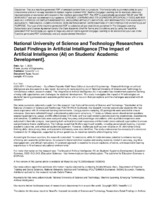 National University of Science and Technology Researchers Detail Findings in Artificial Intelligence [The Impact of Artificial Intelligence (AI) on Students' Academic Development]
National University of Science and Technology Researchers Detail Findings in Artificial Intelligence [The Impact of Artificial Intelligence (AI) on Students' Academic Development] A news article discussing the impact of AI on student' academic development.
-
 Exploring the Impact of Generative Artificial Intelligence
on Higher Education Students’ Utilization of Library
Resources
Exploring the Impact of Generative Artificial Intelligence
on Higher Education Students’ Utilization of Library
Resources
-
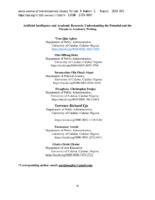 Artificial Intelligence and Academic Research: Understanding the Potential and the Threats to Academic Writing
Artificial Intelligence and Academic Research: Understanding the Potential and the Threats to Academic Writing This paper attempts to reflect on the implications of the adoption of Artificial Intelligence (AI) in academic research. Specifically, it examines the potential and possible threats of AI to academic research
-
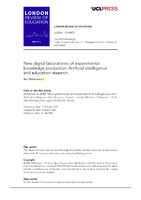 New digital laboratories of experimental knowledge production: Artificial intelligence and education research
New digital laboratories of experimental knowledge production: Artificial intelligence and education research
-
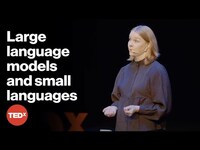 Will AI be able to speak your language? | Linda Heimisdóttir | TEDxReykjavik
Will AI be able to speak your language? | Linda Heimisdóttir | TEDxReykjavik Will linguistic diversity actually survive this AI revolution? Linguist Linda Heimisdóttir explains how English-centered tech and AI tools like ChatGPT pose a risk for smaller languages. In this fascinating talk, she outlines ways to effectively incorporate small languages into Large Language Models.
A linguist by training (PhD from Cornell University, 2015), Dr. Linda Heimisdóttir is the CEO of Miðeind, an Icelandic AI company which specializes in building Language Technology solutions for Icelandic and other under-resourced languages. Since joining the company in January 2023, Linda’s main focus has been on navigating the rapidly evolving landscape of AI-based language technology, which has seen considerable disruption with the advent of Large Language Models. Prior to her appointment at Miðeind, Linda was a US-based Program Manager at Appen, where her focus was on structuring high-quality linguistic training data for NLP and AI applications.
This talk was given at a TEDx event using the TED conference format but independently organized by a local community. Learn more at https://www.ted.com/tedx
-
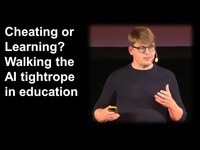 Cheating or Learning? Walking the AI tightrope in education | Erik Winerö | TEDxGöteborg
Cheating or Learning? Walking the AI tightrope in education | Erik Winerö | TEDxGöteborg The lines between learning and cheating become blurred in a world increasingly intertwined with artificial intelligence (AI). In his talk, teacher and researcher Erik Winerö tells a story with a narrative that weaves through the evolution of pole-vaulting technology and the intricacies of coding. The speaker challenges the audience to reconsider the essence of learning in the age of automation. Are we merely reaching higher bars, or are we missing the true journey of learning? Erik Winerö is a teacher and researcher, passionate about learning and IT. Erik has a background as a high school teacher in Swedish and Religion but has also, in recent years, begun to research applied IT in educational science at the University of Gothenburg. This talk was given at a TEDx event using the TED conference format but independently organized by a local community. Learn more at https://www.ted.com/tedx
-
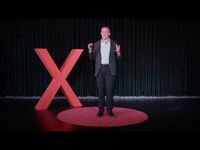 AI Will Reshape Education. Are We Building Tools We Can Trust? | Jim Chilton | TEDxSNHU
AI Will Reshape Education. Are We Building Tools We Can Trust? | Jim Chilton | TEDxSNHU AI offers unprecedented promise in education—personalized tutoring, universal access, and tailored learning—but it also brings risks of misinformation, bias, and outright falsehoods. In this compelling TEDx talk, a seasoned tech and education leader explores a looming crisis: without prioritizing accuracy and truth, we risk creating tools we can’t trust. What happens when our students replace reliable sources of knowledge—trained educators, vetted textbooks, and professional librarians—with tools that may not be fact-based? Jim Chilton is a technology executive with a passion for driving growth and transformation. As the executive vice president and Group CTO at Cengage Group, he leads the innovation efforts and ensures that the Group Technology organization aligns with the company's vision. His role encompasses overseeing product engineering, artificial intelligence programs, internal business systems, cloud computing and cybersecurity. He is deeply committed to giving back to the industry and community and serves as an advisor and board members for several organizations. Chilton received the 2020 Inspire CIO of the Year/Boston ORBIE award and has been a finalist for the National Inspire CIO of the Year ORBIE Award in 2023 and 2024. He’s also been a multi-year recipient of the Apprenti Industry award and HMG Global Leadership award. This talk was given at a TEDx event using the TED conference format but independently organized by a local community. Learn more at https://www.ted.com/tedx
-
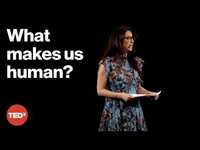 What would a conscious AI look like? | Heather Berlin | TEDxKC
What would a conscious AI look like? | Heather Berlin | TEDxKC Neuroscientist Dr. Heather Berlin explains why AI will never be conscious in its current form. AI will eventually be able to DO much of what we can do, but it will never BE what we can be. But as we merge with AI via neural implants, when do we stop being human?
Dr. Heather Berlin is a neuroscientist, a clinical psychologist, and an associate clinical professor of psychiatry and neuroscience at the Icahn School of Medicine at Mount Sinai in NY. She explores the neural basis of impulsive and compulsive psychiatric and neurological disorders with the goal of developing novel treatments. She is also interested in the brain basis of consciousness, dynamic unconscious processes, and creativity.
Heather hosts the Nova series "Your Brain" on PBS, where she explores the latest research on the neural basis of consciousness. She previously hosted "Science Goes to the Movies" on PBS and Discovery Channel's "Superhuman Showdown." She makes regular appearances on "Startalk" with Neil DeGrasse Tyson, and has appeared on the BBC, History Channel, Netflix, National Geographic, and TED. This talk was given at a TEDx event using the TED conference format but independently organized by a local community. Learn more at https://www.ted.com/ted
-
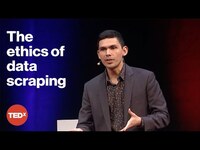 The problem with AI-generated art | Steven Zapata | TEDxBerkeley
The problem with AI-generated art | Steven Zapata | TEDxBerkeley Steven Zapata tackles the rise of AI-generated art and the consequences and questions this technology poses for artists and broader society. Steven Zapata has alway had a great love for drawing. From a young age, his avid sketching was fueled by a voracious appetite for video games, horror movies, science fiction novels, and pulpy paranormal reporting. A native New Yorker, his frequent visits to the Metropolitan Museum of Art inspired him to strive for the fluency and freedom of the old masters in his own imaginative work.
Shortly after high school, he moved to Los Angeles to attend Art Center College of Design and went on to work in video games, film, theme parks, and advertising. He continued his work in entertainment after moving back to New York and began teaching art, both independently and at Art Center. After a decade in commercial art, he began to reorient his focus towards online education and nurturing the love of drawing in all those attracted to it. In 2019, he began a YouTube channel where he shares video essays about the mental challenges that accompany an art practice, and where he tries to guide viewers towards the truly strange and spiritual aspects of drawing. In 2022 he published a video, “The End of Art: An Argument Against Image AIs” where he expressed his concerns about the training practices of text-to-image models. This talk was given at a TEDx event using the TED conference format but independently organized by a local community. Learn more at https://www.ted.com/tedx
-
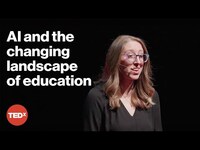 Should we let students use ChatGPT? | Natasha Berg | TEDxSioux Falls
Should we let students use ChatGPT? | Natasha Berg | TEDxSioux Falls The emergence of ChatGPT in November of 2022 took the world by storm: particularly the world of education. With this technology able to generate complex pieces of writing, solve advanced math equations, generate code, and more with the push of a button, educators across the country have entered a state of panic. How are educators supposed to teach students when they have this technology at their literal fingertips?
For too long, the field of education has been teetering at the precipice of serious change, and the widespread accessibility of generative AI may just be the catalyst education needs in order to progress in tandem with the rest of the world. But first, educators need to reevaluate their answer to the tough question: why do we teach?
Natasha Berg, M.Ed. works as the Multimedia and Technology Integration Specialist at a local high school in South Dakota. She has spent her career learning about and developing her skills in education and educational technology. Berg believes that new and emerging technology should be integrated into classrooms as it fully prepares students to enter the 21st century workforce and helps make learning accessible to students of all abilities. This talk was given at a TEDx event using the TED conference format but independently organized by a local community. Learn more at https://www.ted.com/tedx
-
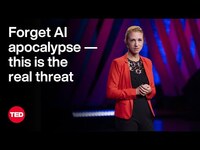 AI Is Dangerous, but Not for the Reasons You Think | Sasha Luccioni | TED
AI Is Dangerous, but Not for the Reasons You Think | Sasha Luccioni | TED AI won't kill us all — but that doesn't make it trustworthy. Instead of getting distracted by future existential risks, AI ethics researcher Sasha Luccioni thinks we need to focus on the technology's current negative impacts, like emitting carbon, infringing copyrights and spreading biased information. She offers practical solutions to regulate our AI-filled future — so it's inclusive and transparent.
-
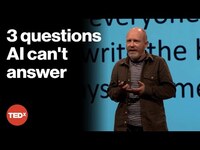 Why ChatGPT can't write for you | David Savill | TEDxUniversityofSalford
Why ChatGPT can't write for you | David Savill | TEDxUniversityofSalford David shows us the importance of reading and writing in developing and maintaining society, democracy, critical thinking skills, and humanity. With the rise of artificial intelligence, he shares the importance of human intelligence and the three questions AI cannot answer for us.
David Savill is a novelist and Senior Lecturer in Creative Writing at The University of Salford. He is the author of They Are Trying To Break Your Heart (Bloomsbury), winner of the French First Novel prize for the best English Language debut novel, and nominated for the Desmond Elliot prize. He is a former BBC Current Affairs producer and journalist who made investigative programmes for Panorama, This World, Real Story and Radio 4’s Crossing Continents. At the University of Salford, he founded the world’s first Creative Writing Multidiscipline degree, guiding students through courses in writing, media production and podcasting to become the future of creative industries. His current research explores what we can learn about politics and the health of democracy through storytelling.
This talk was given at a TEDx event using the TED conference format but independently organized by a local community. Learn more at https://www.ted.com/tedx
-
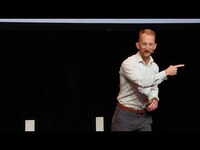 AI in Schools: Cheater or Tutor? | Paul Matthews | TEDxHobart
AI in Schools: Cheater or Tutor? | Paul Matthews | TEDxHobart Paul Matthews explores the potential of AI in education. He outlines how AI can deliver personalised, feedback-rich environments once thought impossible, enabling students of all abilities to thrive at school. Paul is a Tasmanian AI in Education consultant and start-up CEO on a mission to solve the education crisis. He empowers students, teachers, and school communities to excel in a world infused with Artificial Intelligence.
Paul collaborates with school communities to integrate AI-driven solutions, enhancing learning experiences. As a sought-after speaker, he inspires educators and students through engaging presentations. His consultancy offers tailored strategies for modern education challenges.
Combining speaking, consultancy, coaching, and authorship, Paul drives positive change in education, helping schools embrace the possibilities of AI in education. This talk was given at a TEDx event using the TED conference format but independently organized by a local community. Learn more at https://www.ted.com/tedx
-
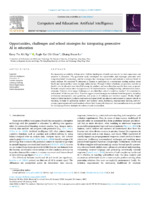 Opportunities, challenges and school strategies for integrating generative
AI in education
Opportunities, challenges and school strategies for integrating generative
AI in education
 The 15 Biggest Risks Of Artificial Intelligence As the world witnesses unprecedented growth in artificial intelligence (AI) technologies, it's essential to consider the potential risks and challenges associated with their widespread adoption. AI does present some significant dangers — from job displacement to security and privacy concerns — and encouraging awareness of issues helps us engage in conversations about AI's legal, ethical, and societal implications.
The 15 Biggest Risks Of Artificial Intelligence As the world witnesses unprecedented growth in artificial intelligence (AI) technologies, it's essential to consider the potential risks and challenges associated with their widespread adoption. AI does present some significant dangers — from job displacement to security and privacy concerns — and encouraging awareness of issues helps us engage in conversations about AI's legal, ethical, and societal implications. What Are the Biggest Perceived Dangers of AI? 16,795 respondents (13-64 y/o) in 17 countries surveyed online Jul.-Aug. 2023
What Are the Biggest Perceived Dangers of AI? 16,795 respondents (13-64 y/o) in 17 countries surveyed online Jul.-Aug. 2023 New report assesses progress and risks of artificial intelligence A report by a panel of experts chaired by a Brown professor concludes that AI has made a major leap from the lab to people’s lives in recent years, which increases the urgency to understand its potential negative effects.
New report assesses progress and risks of artificial intelligence A report by a panel of experts chaired by a Brown professor concludes that AI has made a major leap from the lab to people’s lives in recent years, which increases the urgency to understand its potential negative effects. The Impact of Artificial Intelligence on Education A blog post from a contributor with Forbes.
The Impact of Artificial Intelligence on Education A blog post from a contributor with Forbes. AI Technology is Disrupting the Traditional Classroom. Here’s a Progress Report. A news posts from PBS focusing on how artificial intelligence has the potential to personalize learning at scale. The challenge: making sure it benefits everyone.
AI Technology is Disrupting the Traditional Classroom. Here’s a Progress Report. A news posts from PBS focusing on how artificial intelligence has the potential to personalize learning at scale. The challenge: making sure it benefits everyone. How ChatGPT and similar AI will disrupt education A news post on how teachers are concerned about cheating and inaccurate information.
How ChatGPT and similar AI will disrupt education A news post on how teachers are concerned about cheating and inaccurate information. Is AI exacerbating disparities in education? Stanford students’ contribution to a U.N. report on global education emphasized the importance of including community stakeholders when deploying new technologies, to avoid “perpetuating past mistakes and encoding them into the future.”
Is AI exacerbating disparities in education? Stanford students’ contribution to a U.N. report on global education emphasized the importance of including community stakeholders when deploying new technologies, to avoid “perpetuating past mistakes and encoding them into the future.” The impact of artificial intelligence on learner–instructor interaction in online learning
The impact of artificial intelligence on learner–instructor interaction in online learning  Effects of higher education institutes’ artificial intelligence
capability on students’ self‑efficacy, creativity and learning
performance
Effects of higher education institutes’ artificial intelligence
capability on students’ self‑efficacy, creativity and learning
performance  Integrating Ethics and Career Futures with Technical Learning to Promote AI Literacy for Middle School Students: An Exploratory Study
Integrating Ethics and Career Futures with Technical Learning to Promote AI Literacy for Middle School Students: An Exploratory Study  University of Michigan Researcher Reports Recent Findings in Artificial Intelligence (Public Health Students and Instructors Weigh in on Generative Artificial Intelligence: Are They on The Same Page?) A news article comparing public health students and instructors on their perspectives of generative artificial intelligence.
University of Michigan Researcher Reports Recent Findings in Artificial Intelligence (Public Health Students and Instructors Weigh in on Generative Artificial Intelligence: Are They on The Same Page?) A news article comparing public health students and instructors on their perspectives of generative artificial intelligence. National University of Science and Technology Researchers Detail Findings in Artificial Intelligence [The Impact of Artificial Intelligence (AI) on Students' Academic Development] A news article discussing the impact of AI on student' academic development.
National University of Science and Technology Researchers Detail Findings in Artificial Intelligence [The Impact of Artificial Intelligence (AI) on Students' Academic Development] A news article discussing the impact of AI on student' academic development. Exploring the Impact of Generative Artificial Intelligence
on Higher Education Students’ Utilization of Library
Resources
Exploring the Impact of Generative Artificial Intelligence
on Higher Education Students’ Utilization of Library
Resources  Artificial Intelligence and Academic Research: Understanding the Potential and the Threats to Academic Writing This paper attempts to reflect on the implications of the adoption of Artificial Intelligence (AI) in academic research. Specifically, it examines the potential and possible threats of AI to academic research
Artificial Intelligence and Academic Research: Understanding the Potential and the Threats to Academic Writing This paper attempts to reflect on the implications of the adoption of Artificial Intelligence (AI) in academic research. Specifically, it examines the potential and possible threats of AI to academic research New digital laboratories of experimental knowledge production: Artificial intelligence and education research
New digital laboratories of experimental knowledge production: Artificial intelligence and education research  Will AI be able to speak your language? | Linda Heimisdóttir | TEDxReykjavik Will linguistic diversity actually survive this AI revolution? Linguist Linda Heimisdóttir explains how English-centered tech and AI tools like ChatGPT pose a risk for smaller languages. In this fascinating talk, she outlines ways to effectively incorporate small languages into Large Language Models. A linguist by training (PhD from Cornell University, 2015), Dr. Linda Heimisdóttir is the CEO of Miðeind, an Icelandic AI company which specializes in building Language Technology solutions for Icelandic and other under-resourced languages. Since joining the company in January 2023, Linda’s main focus has been on navigating the rapidly evolving landscape of AI-based language technology, which has seen considerable disruption with the advent of Large Language Models. Prior to her appointment at Miðeind, Linda was a US-based Program Manager at Appen, where her focus was on structuring high-quality linguistic training data for NLP and AI applications. This talk was given at a TEDx event using the TED conference format but independently organized by a local community. Learn more at https://www.ted.com/tedx
Will AI be able to speak your language? | Linda Heimisdóttir | TEDxReykjavik Will linguistic diversity actually survive this AI revolution? Linguist Linda Heimisdóttir explains how English-centered tech and AI tools like ChatGPT pose a risk for smaller languages. In this fascinating talk, she outlines ways to effectively incorporate small languages into Large Language Models. A linguist by training (PhD from Cornell University, 2015), Dr. Linda Heimisdóttir is the CEO of Miðeind, an Icelandic AI company which specializes in building Language Technology solutions for Icelandic and other under-resourced languages. Since joining the company in January 2023, Linda’s main focus has been on navigating the rapidly evolving landscape of AI-based language technology, which has seen considerable disruption with the advent of Large Language Models. Prior to her appointment at Miðeind, Linda was a US-based Program Manager at Appen, where her focus was on structuring high-quality linguistic training data for NLP and AI applications. This talk was given at a TEDx event using the TED conference format but independently organized by a local community. Learn more at https://www.ted.com/tedx Cheating or Learning? Walking the AI tightrope in education | Erik Winerö | TEDxGöteborg The lines between learning and cheating become blurred in a world increasingly intertwined with artificial intelligence (AI). In his talk, teacher and researcher Erik Winerö tells a story with a narrative that weaves through the evolution of pole-vaulting technology and the intricacies of coding. The speaker challenges the audience to reconsider the essence of learning in the age of automation. Are we merely reaching higher bars, or are we missing the true journey of learning? Erik Winerö is a teacher and researcher, passionate about learning and IT. Erik has a background as a high school teacher in Swedish and Religion but has also, in recent years, begun to research applied IT in educational science at the University of Gothenburg. This talk was given at a TEDx event using the TED conference format but independently organized by a local community. Learn more at https://www.ted.com/tedx
Cheating or Learning? Walking the AI tightrope in education | Erik Winerö | TEDxGöteborg The lines between learning and cheating become blurred in a world increasingly intertwined with artificial intelligence (AI). In his talk, teacher and researcher Erik Winerö tells a story with a narrative that weaves through the evolution of pole-vaulting technology and the intricacies of coding. The speaker challenges the audience to reconsider the essence of learning in the age of automation. Are we merely reaching higher bars, or are we missing the true journey of learning? Erik Winerö is a teacher and researcher, passionate about learning and IT. Erik has a background as a high school teacher in Swedish and Religion but has also, in recent years, begun to research applied IT in educational science at the University of Gothenburg. This talk was given at a TEDx event using the TED conference format but independently organized by a local community. Learn more at https://www.ted.com/tedx AI Will Reshape Education. Are We Building Tools We Can Trust? | Jim Chilton | TEDxSNHU AI offers unprecedented promise in education—personalized tutoring, universal access, and tailored learning—but it also brings risks of misinformation, bias, and outright falsehoods. In this compelling TEDx talk, a seasoned tech and education leader explores a looming crisis: without prioritizing accuracy and truth, we risk creating tools we can’t trust. What happens when our students replace reliable sources of knowledge—trained educators, vetted textbooks, and professional librarians—with tools that may not be fact-based? Jim Chilton is a technology executive with a passion for driving growth and transformation. As the executive vice president and Group CTO at Cengage Group, he leads the innovation efforts and ensures that the Group Technology organization aligns with the company's vision. His role encompasses overseeing product engineering, artificial intelligence programs, internal business systems, cloud computing and cybersecurity. He is deeply committed to giving back to the industry and community and serves as an advisor and board members for several organizations. Chilton received the 2020 Inspire CIO of the Year/Boston ORBIE award and has been a finalist for the National Inspire CIO of the Year ORBIE Award in 2023 and 2024. He’s also been a multi-year recipient of the Apprenti Industry award and HMG Global Leadership award. This talk was given at a TEDx event using the TED conference format but independently organized by a local community. Learn more at https://www.ted.com/tedx
AI Will Reshape Education. Are We Building Tools We Can Trust? | Jim Chilton | TEDxSNHU AI offers unprecedented promise in education—personalized tutoring, universal access, and tailored learning—but it also brings risks of misinformation, bias, and outright falsehoods. In this compelling TEDx talk, a seasoned tech and education leader explores a looming crisis: without prioritizing accuracy and truth, we risk creating tools we can’t trust. What happens when our students replace reliable sources of knowledge—trained educators, vetted textbooks, and professional librarians—with tools that may not be fact-based? Jim Chilton is a technology executive with a passion for driving growth and transformation. As the executive vice president and Group CTO at Cengage Group, he leads the innovation efforts and ensures that the Group Technology organization aligns with the company's vision. His role encompasses overseeing product engineering, artificial intelligence programs, internal business systems, cloud computing and cybersecurity. He is deeply committed to giving back to the industry and community and serves as an advisor and board members for several organizations. Chilton received the 2020 Inspire CIO of the Year/Boston ORBIE award and has been a finalist for the National Inspire CIO of the Year ORBIE Award in 2023 and 2024. He’s also been a multi-year recipient of the Apprenti Industry award and HMG Global Leadership award. This talk was given at a TEDx event using the TED conference format but independently organized by a local community. Learn more at https://www.ted.com/tedx What would a conscious AI look like? | Heather Berlin | TEDxKC Neuroscientist Dr. Heather Berlin explains why AI will never be conscious in its current form. AI will eventually be able to DO much of what we can do, but it will never BE what we can be. But as we merge with AI via neural implants, when do we stop being human? Dr. Heather Berlin is a neuroscientist, a clinical psychologist, and an associate clinical professor of psychiatry and neuroscience at the Icahn School of Medicine at Mount Sinai in NY. She explores the neural basis of impulsive and compulsive psychiatric and neurological disorders with the goal of developing novel treatments. She is also interested in the brain basis of consciousness, dynamic unconscious processes, and creativity. Heather hosts the Nova series "Your Brain" on PBS, where she explores the latest research on the neural basis of consciousness. She previously hosted "Science Goes to the Movies" on PBS and Discovery Channel's "Superhuman Showdown." She makes regular appearances on "Startalk" with Neil DeGrasse Tyson, and has appeared on the BBC, History Channel, Netflix, National Geographic, and TED. This talk was given at a TEDx event using the TED conference format but independently organized by a local community. Learn more at https://www.ted.com/ted
What would a conscious AI look like? | Heather Berlin | TEDxKC Neuroscientist Dr. Heather Berlin explains why AI will never be conscious in its current form. AI will eventually be able to DO much of what we can do, but it will never BE what we can be. But as we merge with AI via neural implants, when do we stop being human? Dr. Heather Berlin is a neuroscientist, a clinical psychologist, and an associate clinical professor of psychiatry and neuroscience at the Icahn School of Medicine at Mount Sinai in NY. She explores the neural basis of impulsive and compulsive psychiatric and neurological disorders with the goal of developing novel treatments. She is also interested in the brain basis of consciousness, dynamic unconscious processes, and creativity. Heather hosts the Nova series "Your Brain" on PBS, where she explores the latest research on the neural basis of consciousness. She previously hosted "Science Goes to the Movies" on PBS and Discovery Channel's "Superhuman Showdown." She makes regular appearances on "Startalk" with Neil DeGrasse Tyson, and has appeared on the BBC, History Channel, Netflix, National Geographic, and TED. This talk was given at a TEDx event using the TED conference format but independently organized by a local community. Learn more at https://www.ted.com/ted The problem with AI-generated art | Steven Zapata | TEDxBerkeley Steven Zapata tackles the rise of AI-generated art and the consequences and questions this technology poses for artists and broader society. Steven Zapata has alway had a great love for drawing. From a young age, his avid sketching was fueled by a voracious appetite for video games, horror movies, science fiction novels, and pulpy paranormal reporting. A native New Yorker, his frequent visits to the Metropolitan Museum of Art inspired him to strive for the fluency and freedom of the old masters in his own imaginative work. Shortly after high school, he moved to Los Angeles to attend Art Center College of Design and went on to work in video games, film, theme parks, and advertising. He continued his work in entertainment after moving back to New York and began teaching art, both independently and at Art Center. After a decade in commercial art, he began to reorient his focus towards online education and nurturing the love of drawing in all those attracted to it. In 2019, he began a YouTube channel where he shares video essays about the mental challenges that accompany an art practice, and where he tries to guide viewers towards the truly strange and spiritual aspects of drawing. In 2022 he published a video, “The End of Art: An Argument Against Image AIs” where he expressed his concerns about the training practices of text-to-image models. This talk was given at a TEDx event using the TED conference format but independently organized by a local community. Learn more at https://www.ted.com/tedx
The problem with AI-generated art | Steven Zapata | TEDxBerkeley Steven Zapata tackles the rise of AI-generated art and the consequences and questions this technology poses for artists and broader society. Steven Zapata has alway had a great love for drawing. From a young age, his avid sketching was fueled by a voracious appetite for video games, horror movies, science fiction novels, and pulpy paranormal reporting. A native New Yorker, his frequent visits to the Metropolitan Museum of Art inspired him to strive for the fluency and freedom of the old masters in his own imaginative work. Shortly after high school, he moved to Los Angeles to attend Art Center College of Design and went on to work in video games, film, theme parks, and advertising. He continued his work in entertainment after moving back to New York and began teaching art, both independently and at Art Center. After a decade in commercial art, he began to reorient his focus towards online education and nurturing the love of drawing in all those attracted to it. In 2019, he began a YouTube channel where he shares video essays about the mental challenges that accompany an art practice, and where he tries to guide viewers towards the truly strange and spiritual aspects of drawing. In 2022 he published a video, “The End of Art: An Argument Against Image AIs” where he expressed his concerns about the training practices of text-to-image models. This talk was given at a TEDx event using the TED conference format but independently organized by a local community. Learn more at https://www.ted.com/tedx Should we let students use ChatGPT? | Natasha Berg | TEDxSioux Falls The emergence of ChatGPT in November of 2022 took the world by storm: particularly the world of education. With this technology able to generate complex pieces of writing, solve advanced math equations, generate code, and more with the push of a button, educators across the country have entered a state of panic. How are educators supposed to teach students when they have this technology at their literal fingertips? For too long, the field of education has been teetering at the precipice of serious change, and the widespread accessibility of generative AI may just be the catalyst education needs in order to progress in tandem with the rest of the world. But first, educators need to reevaluate their answer to the tough question: why do we teach? Natasha Berg, M.Ed. works as the Multimedia and Technology Integration Specialist at a local high school in South Dakota. She has spent her career learning about and developing her skills in education and educational technology. Berg believes that new and emerging technology should be integrated into classrooms as it fully prepares students to enter the 21st century workforce and helps make learning accessible to students of all abilities. This talk was given at a TEDx event using the TED conference format but independently organized by a local community. Learn more at https://www.ted.com/tedx
Should we let students use ChatGPT? | Natasha Berg | TEDxSioux Falls The emergence of ChatGPT in November of 2022 took the world by storm: particularly the world of education. With this technology able to generate complex pieces of writing, solve advanced math equations, generate code, and more with the push of a button, educators across the country have entered a state of panic. How are educators supposed to teach students when they have this technology at their literal fingertips? For too long, the field of education has been teetering at the precipice of serious change, and the widespread accessibility of generative AI may just be the catalyst education needs in order to progress in tandem with the rest of the world. But first, educators need to reevaluate their answer to the tough question: why do we teach? Natasha Berg, M.Ed. works as the Multimedia and Technology Integration Specialist at a local high school in South Dakota. She has spent her career learning about and developing her skills in education and educational technology. Berg believes that new and emerging technology should be integrated into classrooms as it fully prepares students to enter the 21st century workforce and helps make learning accessible to students of all abilities. This talk was given at a TEDx event using the TED conference format but independently organized by a local community. Learn more at https://www.ted.com/tedx AI Is Dangerous, but Not for the Reasons You Think | Sasha Luccioni | TED AI won't kill us all — but that doesn't make it trustworthy. Instead of getting distracted by future existential risks, AI ethics researcher Sasha Luccioni thinks we need to focus on the technology's current negative impacts, like emitting carbon, infringing copyrights and spreading biased information. She offers practical solutions to regulate our AI-filled future — so it's inclusive and transparent.
AI Is Dangerous, but Not for the Reasons You Think | Sasha Luccioni | TED AI won't kill us all — but that doesn't make it trustworthy. Instead of getting distracted by future existential risks, AI ethics researcher Sasha Luccioni thinks we need to focus on the technology's current negative impacts, like emitting carbon, infringing copyrights and spreading biased information. She offers practical solutions to regulate our AI-filled future — so it's inclusive and transparent. Why ChatGPT can't write for you | David Savill | TEDxUniversityofSalford David shows us the importance of reading and writing in developing and maintaining society, democracy, critical thinking skills, and humanity. With the rise of artificial intelligence, he shares the importance of human intelligence and the three questions AI cannot answer for us. David Savill is a novelist and Senior Lecturer in Creative Writing at The University of Salford. He is the author of They Are Trying To Break Your Heart (Bloomsbury), winner of the French First Novel prize for the best English Language debut novel, and nominated for the Desmond Elliot prize. He is a former BBC Current Affairs producer and journalist who made investigative programmes for Panorama, This World, Real Story and Radio 4’s Crossing Continents. At the University of Salford, he founded the world’s first Creative Writing Multidiscipline degree, guiding students through courses in writing, media production and podcasting to become the future of creative industries. His current research explores what we can learn about politics and the health of democracy through storytelling. This talk was given at a TEDx event using the TED conference format but independently organized by a local community. Learn more at https://www.ted.com/tedx
Why ChatGPT can't write for you | David Savill | TEDxUniversityofSalford David shows us the importance of reading and writing in developing and maintaining society, democracy, critical thinking skills, and humanity. With the rise of artificial intelligence, he shares the importance of human intelligence and the three questions AI cannot answer for us. David Savill is a novelist and Senior Lecturer in Creative Writing at The University of Salford. He is the author of They Are Trying To Break Your Heart (Bloomsbury), winner of the French First Novel prize for the best English Language debut novel, and nominated for the Desmond Elliot prize. He is a former BBC Current Affairs producer and journalist who made investigative programmes for Panorama, This World, Real Story and Radio 4’s Crossing Continents. At the University of Salford, he founded the world’s first Creative Writing Multidiscipline degree, guiding students through courses in writing, media production and podcasting to become the future of creative industries. His current research explores what we can learn about politics and the health of democracy through storytelling. This talk was given at a TEDx event using the TED conference format but independently organized by a local community. Learn more at https://www.ted.com/tedx AI in Schools: Cheater or Tutor? | Paul Matthews | TEDxHobart Paul Matthews explores the potential of AI in education. He outlines how AI can deliver personalised, feedback-rich environments once thought impossible, enabling students of all abilities to thrive at school. Paul is a Tasmanian AI in Education consultant and start-up CEO on a mission to solve the education crisis. He empowers students, teachers, and school communities to excel in a world infused with Artificial Intelligence. Paul collaborates with school communities to integrate AI-driven solutions, enhancing learning experiences. As a sought-after speaker, he inspires educators and students through engaging presentations. His consultancy offers tailored strategies for modern education challenges. Combining speaking, consultancy, coaching, and authorship, Paul drives positive change in education, helping schools embrace the possibilities of AI in education. This talk was given at a TEDx event using the TED conference format but independently organized by a local community. Learn more at https://www.ted.com/tedx
AI in Schools: Cheater or Tutor? | Paul Matthews | TEDxHobart Paul Matthews explores the potential of AI in education. He outlines how AI can deliver personalised, feedback-rich environments once thought impossible, enabling students of all abilities to thrive at school. Paul is a Tasmanian AI in Education consultant and start-up CEO on a mission to solve the education crisis. He empowers students, teachers, and school communities to excel in a world infused with Artificial Intelligence. Paul collaborates with school communities to integrate AI-driven solutions, enhancing learning experiences. As a sought-after speaker, he inspires educators and students through engaging presentations. His consultancy offers tailored strategies for modern education challenges. Combining speaking, consultancy, coaching, and authorship, Paul drives positive change in education, helping schools embrace the possibilities of AI in education. This talk was given at a TEDx event using the TED conference format but independently organized by a local community. Learn more at https://www.ted.com/tedx Opportunities, challenges and school strategies for integrating generative
AI in education
Opportunities, challenges and school strategies for integrating generative
AI in education